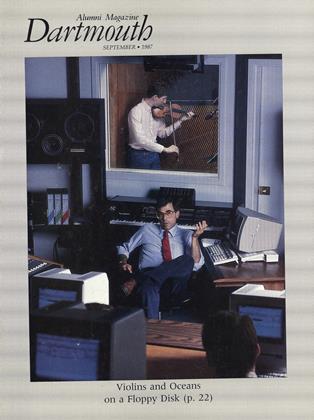When Dr. Jack Porvaznik '55 finished his studies at the Dartmouth Medical School and Harvard and completed his surgical training at Massachusetts General Hospital, he traded in eastern city living for life on the Navajo Reservation in New Mexico. He and his wife, Eunice, who was a nurse at Mary Hitchcock Memorial Hospital when Porvaznik was at DMS, have spent the last 25 years in the Southwest providing medical care to Navajos.
Porvaznik is both the chief surgeon and medical director of the Emergency Medical Services of the Indian Health Service, part of the United States Department of Public Health. In addition to his work at the Gallup Indian Medical Center, he oversees 30 Indian Health Service surgeons on several reservations.
When Porvaznik first arrived on the Navajo Reservation, the greatest medical problems were tuberculosis and other infectious diseases. Now the focus is on fighting the rampant alcoholism that has contributed to auto accidents becoming the leading killer of Native Americans at a rate three to five times higher than for the rest of the population. Porvaznik foresees the decrease of alcoholism and the improvement of life in general for Navajos coming through better education and a greater availability of jobs.
Especially satisfying to Porvaznik is the increase in the number of Navajo physicians, nurses, and other health workers. Among his accomplishments was the institution of emergency services, including fleets of ambulances manned by 500 Native Americans trained as emergency medical technicians. He estimates that there are now approximately 100 Native American physicians in the nation. Twelve of them serve on the Navajo Reservation. Porvaznik remembers when there were none.
Numerous honors have been given to Porvaznik by Native Americans and health agencies. The nominating letter for the Second Annual Health Systems Award, which he received in 1980, encapsulates the respect he has earned: "Dr. Porvaznik's keen awareness of medical knowledge, administrative acumen, idealism tempered with realism, determination and genuine concern for patients, students and colleagues have resulted in improvement in both function and image of the Indian Health Service and in the health care of the Indian people."
Porvaznik's expertise in delivering health care in areas where western medicine may be perceived as clashing with traditional beliefs and practices has caught the attention of the U.S. Agency for International Development and the Office of International Health of the U.S. Public Health Service. He is working with these agencies to advise the Egyptian government on emergency medical care and has done similar consultancies for Saudi Arabia and in the Caribbean.
The Porvazniks have three children: John, a graduate of Arizona State; Mark, who left the Southwest for the Coast Guard Academy in New London and is now at Coast Guard Headquarters in Washington; and Mary, a graduate of the University of New Mexico.
Dr. Jack Porvaznik '55
 View Full Issue
View Full Issue
More From This Issue
-
 Feature
FeatureMystery on the Mountain
September 1987 By Daniel Q. Haney -
 Feature
FeatureDiary of a Long Distance Runner
September 1987 By Tim Hartigan '87 -
 Cover Story
Cover StoryThe Computerization of Music
September 1987 By Jon Appleton -
 Feature
FeatureThe Speech
September 1987 -
 Feature
FeatureHeeding the Beat of a Different Drummer
September 1987 By Teri Allbright -
 Class Notes
Class Notes1976
September 1987 By Martha Hennessey
Article
-
 Article
ArticleTUCK SCHOOL TO SEND REPRERESENTATIVE ON SOUTH AMERICAN TOUR
-
 Article
ArticleEditors' Appreciation
January 1933 -
 Article
ArticleA Wah Hoo Wah for –
December 1957 -
 Article
ArticleAlumni Fund Chairman's Report
October 1976 -
 Article
ArticleFellows
October 1978 -
 Article
ArticleBrief Biographies of Buildings
December 1942 By LEON BURR RICHARDSON '00

